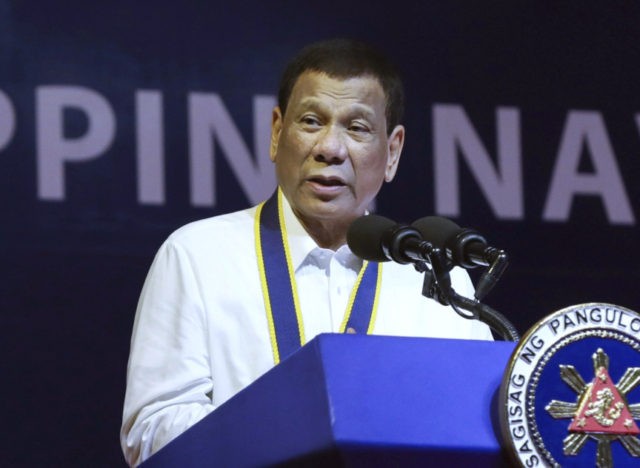China’s government media hailed Philippines President Rodrigo Duterte as a “model for cooperation” with China in a column Tuesday responding to Duterte’s annual State of the Nation address, where he adamantly refused to confront China for illegally occupying Philippine territory.
China claims a significant portion of the waters in Philippine sovereign territory in the South China Sea. Beijing has built military and civilian facilities near the Spratly Islands that an international tribunal declared illegal in 2016 and has continued its activities there, choosing the disregard the ruling. Duterte has insisted on not confronting China there or preventing Chinese ships from fishing illegally in Philippine waters, arguing that China’s military is far larger than the Philippines’ and would massacre the country’s soldiers if adequately challenged.
During his State of the Nation speech Monday, Duterte insisted he would not make “more widows and more orphans” by insisting that China respect Philippine sovereignty.
“Why did Duterte persist in acting in a peaceful, cooperative and restrained way in the South China Sea despite some domestic criticism and US instigation?” China’s state-run Global Times newspaper asked on Tuesday. “Because Duterte has realized that putting disputes aside and seeking cooperation with China brings most benefits to his country. Through cooperative development, China and the Philippines are making an effort to ease tensions in the region and explore a new path of regional cooperation.”
Cooperation with the Chinese Communist Party on economic matters, impossible without accepting China’s illegal claims on Philippine territory, “not only eases Manila’s pressure of imports, but also reduces its over-reliance on the international energy market,” the newspaper alleged.
“Such cooperation also improves the Philippines’ energy structure and will greatly benefit the country in the long run. Instead of struggling with disputes, doesn’t such win-win cooperation bring greater advantage to both sides?” the Global Times asked.
Duterte has faced significant pressure domestically to challenge China’s claims in the region, particularly following an incident in which a Chinese vessel sank an anchored Filipino fishing ship in sovereign Philippine waters and abruptly left, leaving the crew to die. A Vietnamese ship’s crew saved the Filipino fishermen, but protests erupted in Manila demanding China be expelled from Philippine waters. While the presidential palace initially called the sinking “barbaric,” Duterte rapidly intervened and rejected calls for using force to remove Chinese ships illegally present in the Philippines. Opposition politicians called for Duterte to be impeached while Duterte demanded the United States preemptively attack China for the sinking, citing a mutual defense treaty between Washington and Manila.
China claims territory in the South China Sea legally under sovereign control of the Philippines, Vietnam, Brunei, Malaysia, and Taiwan. As China does not recognize Taiwan’s sovereignty, it insists that any territory under Taiwan’s control is Chinese, as Taiwan is a “province” of China.
“The avoidance of conflict – armed conflict and protection of our territorial waters and natural resources compel us to perform a delicate balancing act,” Duterte said in his speech Monday night, an annual address akin to the American State of the Union. “A shooting war is grief and misery multiplier. War leaves widows and orphans in its wake. I am not ready or inclined to accept the occurrence of more destruction, more widows and more orphans, should war, even on a limited scale, breaks out.”
“Corruption does not stop by simply telling the plunderers to stop. Neither is it stopped by reinstating the death penalty. It is stopped by prosecuting and jailing thieves in government, instead of freeing them,” Senator Leila De Lima, one of Duterte’s most prominent opponents, said after the speech. “In the same way, a comprehensive independent foreign policy is not achieved by being China’s lapdog. One cannot defend the nation and its sovereignty by appeasing China and turning the country into its satellite State.”
The senator concluded that the speech was “insufferable” and the elderly Duterte should “just rest.”
De Lima did not attend the speech because she is currently under police custody on charges of being involved in drug trafficking.
Duterte opponents similarly condemned his call for the death penalty, and remarks by his spokesman Salvador Panelo that Duterte would prefer hanging as the mode of capital punishment as it is cheaper.
“That method has been in obsolescence even among animals. It is better to discuss the parameters of the proposed law,” Senior Deputy Minority Leader Rep. Janette Garin said on Wednesday, urging Duterte to not “go back to the Stone Age.”
The Catholic Church, to which the majority of Filipinos belong, also protested the death penalty proposal.
“I find that we are again retrogressing. I thought that we were already moving toward a more humane civilization and society,” Bacolod Bishop Patricio Buzon said. “Our stand is very clear. Even in the Church, we have already grown in maturity about understanding that issue. It’s sad. I think we are moving backward.”

COMMENTS
Please let us know if you're having issues with commenting.